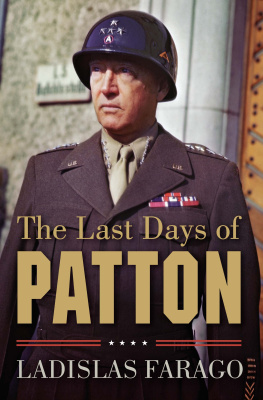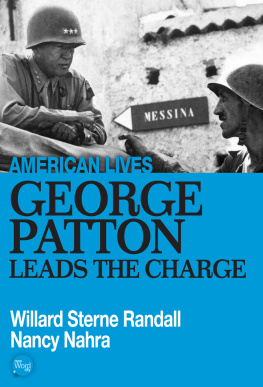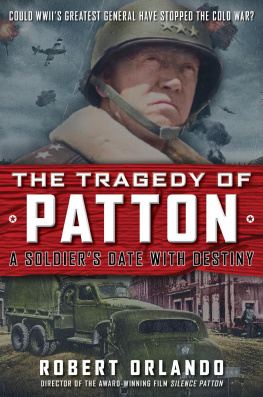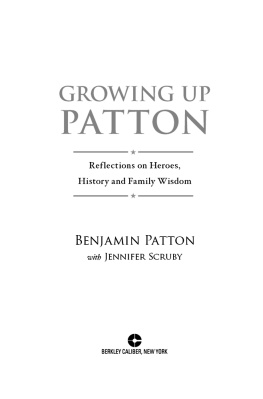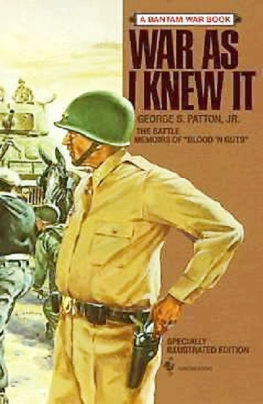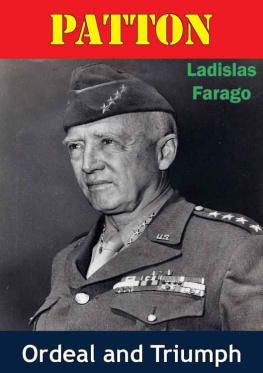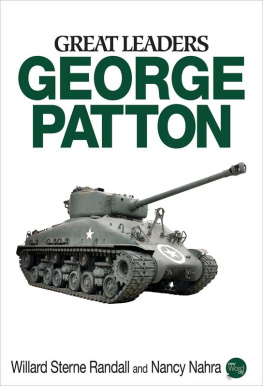LADISLAS FARAGO died several weeks before this book went to press. His indefatigable commitment to the completion of this work during the months just prior to his death inspired all who worked with him.
ACKNOWLEDGMENTS
THE NEW MATERIAL gathered for this book amazed me for its richness and for the difficulty of access to it. This was why the writing of The Last Days of Patton took much longerfive years, in fact, instead of the two originally scheduled. During those years, I spent many months in Germanyin Bad Toelz and in Bad Nauheim, following Patton's footsteps; in Heidelberg, at his bedside, so to speak; and in the Kaeferthal near Mannheim, conjuring up his ghost.
In the end, I managed to piece together the story of his last days in a mosaic that, I hope, is complete, fair, and balanced. This book, therefore, is based almost entirely on primary sources: on documentary evidence supplemented by, rather than substituted for, interviews. Foremost among my sources are General Patton's 201 File in the Office of the Adjutant General of the United States Army and the private papers of Professor Walter L. Dorn, in the possession of his daughter, Mrs. Ellen Dorn Warburton.
I must therefore acknowledge my debt to Mr. Waldemar A. Anderson, who was instrumental in arranging access for me to General Patton's official file. And I am also deeply indebted to Mrs. Warburton, who agreed to bring a battered old suitcase from her attic in Washington, D.C. She had preservedher father's papers, including an unpublished manuscript he had completed shortly before his death in 1961. It was to be called, characteristically, The Unfinished Purge. Also in the suitcase were Professor Dorn's notes on his historic clash with General Patton. I am also grateful to Professor Lutz Niethammer of Essen University, West Germany, who guided me to Mrs. Warburton, and who showed me his own pioneering research on Professor Dorn's activities in Germany in 1945.
Other individuals whose help proved invaluable in the preparation of this book (in alphabetical order): Dr. Abram J. Abeloff, Colonel, Medical Corps, U.S. Army (1942-46); Herrery Akkermans, Assistant Curator, American Battle Monument Commission, Luxembourg; Hollis Alpert, historian, Third U.S. Army (1943-45); Samuel Atkin, M.D.; Senator Peter K. Babalas, Lieutenant, 818th Military Police Company (1945); Colonel Lawrence C. Ball, Commanding Officer, 130th Station Hospital, Seventh U.S. Army, Heidelberg, Germany (1945); Major Abraham L. Baum, U.S. Army (Ret); Victor M. Bernstein; Major Martin Blumenson, U.S. Army, historian, Third U.S. Army, editor of The Patton Papers; Philip M. Cavanaugh, Director, Patton Museum, Fort Knox, Ky.; Colonel Horace B. Clarkson, Commanding Officer, 130th Station Hospital (1978-79); William F. Cunliff, Deputy Chief, Military Records Branch, National Archives and Records Service, Washington, D.C.; Major E.C. (Ernie) Deane, chief press officer, Third U.S. Army (1945); Lieutenant Marjorie Ettinger, executive officer, 130th Station Hospital (1978-79); Charles Fisher, M.D.; Lieutenant Paul Gauthier, U.S. Army, assistant press officer, Third U.S. Army (1945); Lieutenant Hobart R. Gay, U.S. Army (Ret.); the late Lewis Frederick Gitler, intelligence officer, U.S. Army in Germany (1945); Judge Horst von Glasenapp, Bad Homburg, West Germany; General Paul D. Harkins, U.S. Army (Ret.); Colonel Paul S. Hill, chief of surgery, 130th Station Hospital (1945); Carl Levin; the late Frank Earl Mason; Brigadier General Frank McCarthy, Secretary to the General Staff andMilitary Assistant to General George C. Marshall (1943-45); Professor Rolf Nutzmar, University of Essen, West Germany; Dean Saul K. Padover, Intelligence Officer, U.S. Army in Germany (1944-46), Dean, School of Politics, New School for Social Research (1950-55); David J. Pucket, Senior Curator, American Battlefield Monument Commission; John M. Purdy, Curator, Patton Museum; Colonel of the Waffen-SS Richard Schulze, last commandant of the Junkerschule under the Nazis; Mortimer F. Shapiro, M.D.; Andreas Szego; Lieutenant Colonel Harry P. Tech; Dr. Thomas Thalken, Director, Herbert Hoover Library; Hans M. Weindl, public relations director, Flint Kaserne; Robert Wood, Associate Director, Herbert Hoover Library; Horace L. Woodring; and the brilliant and helpful staff of the Army's Center of Military History, in whose ranks Hannah Zeidel was particularly cooperative.
Throughout the preparation of this book I was immensely gratified by the impressive and incomparably astute editorial work of McGraw-Hill Senior Editor Gladys Justin Carr.
I found nothing but understanding and generosity from Leslie Meredith, Assistant Editor, and I appreciate the care and industry of Rita Stein, a superb copyeditor.
To Arthur Neuhauser, my old friend and veteran editorial consultant, who was my editor on Patton: Ordeal and Triumph, go my thanks for another mission so well accomplished; thanks also go to Isabelle Bates for a typing job that was nothing less than inspired and constructive throughout.
I would like to celebrate here the twentieth anniversary of my friendship and association with Maximilian Becker, literary agent extraordinary, who puts up with my moods and whims valiantly and with elegance.
To my wife Liesel, my son John, and my daughter-in-law Sharonwords cannot express my gratitude. They know how I feel, and how much strength and solace I am gaining from their love and support, and from their understanding.
LADISLAS FARAGO
LENOX HILL HOSPITAL
IN A SERIES of tragic ironies, The Last Days of Patton is inextricably intertwined with my father's own last days. As he had just completed the final version of this manuscript for his publisher, he checked into Lenox Hill Hospital in New York City for what he thought would be a rather routine battery of tests. He never left the hospital, and died there six weeks later on October 15, 1980. I write this two days before his funeral.
When he first entered Lenox Hill I worked with him on the copyediting and final detail work that he had brought with him. But one test stretched into another, his stomach condition was revealed as cancer, and a relentless siege of complications and unrelated ailments set in. He suffered a small stroke while in the hospital; his lungs became congested and he ran a continual fever; he contracted endocarditis, which had an unnerving and unpredictable impact on his ability to think, see, or move. Like Patton, he ultimately was for all intents and purposes paralyzed. His kidneys weakened, and finally the cancer extended to his liver and he experienced total organ failure.

